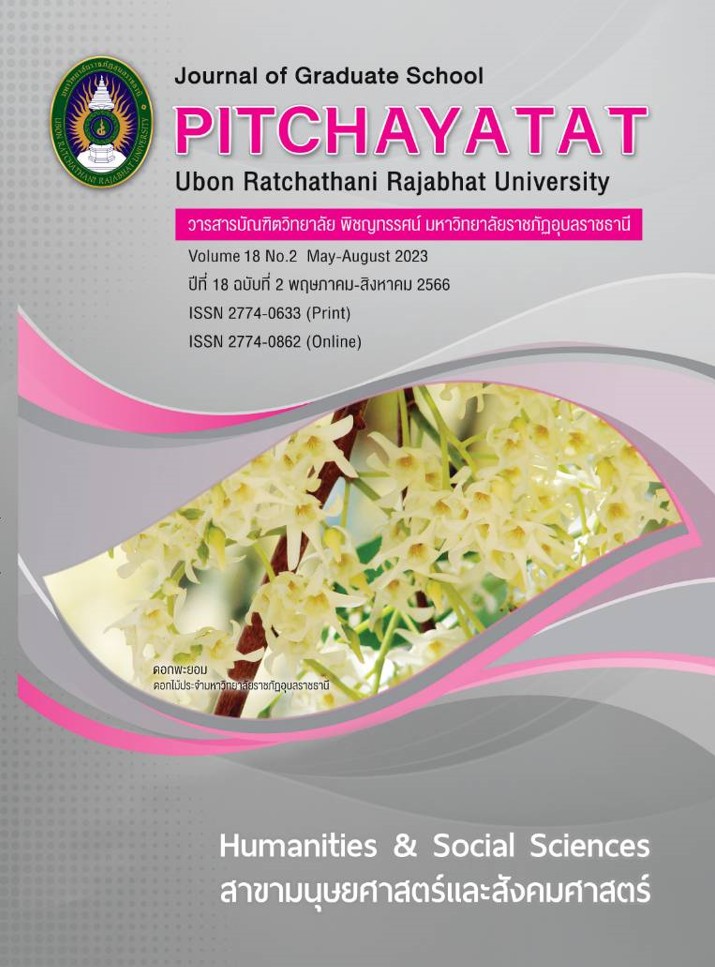การเปรียบเทียบทักษะการคิดแก้ปัญหาทางคณิตศาสตร์และผลสัมฤทธิ์ทางการเรียน เรื่องอัตราส่วน สัดส่วน และร้อยละ ของนักเรียนชั้นมัธยมศึกษาปีที่ 1 ระหว่าง การจัดการเรียนรู้แบบสืบเสาะเชิงแนะนำกับการจัดการเรียนรู้แบบปกติ
คำสำคัญ:
ทักษะการคิดแก้ปัญหาทางคณิตศาสตร์ , ผลสัมฤทธิ์ทางการเรียนคณิตศาสตร์, การจัดการเรียนรู้แบบ สืบเสาะเชิงแนะนำบทคัดย่อ
การวิจัยนี้มีวัตถุประสงค์เพื่อ 1) เปรียบเทียบทักษะการคิดแก้ปัญหาทางคณิตศาสตร์ของนักเรียนชั้นมัธยมศึกษาปีที่ 1 ที่ได้รับการจัดการเรียนรู้แบบสืบเสาะเชิงแนะนำ ก่อนเรียนกับหลังเรียน 2) เปรียบเทียบผลสัมฤทธิ์ทางการเรียนคณิตศาสตร์ของนักเรียนชั้นมัธยมศึกษาปีที่ 1 ที่ได้รับการจัดการเรียนรู้แบบสืบเสาะเชิงแนะนำ ก่อนเรียนกับหลังเรียน 3) เปรียบเทียบทักษะการคิดแก้ปัญหาทางคณิตศาสตร์ของนักเรียนชั้นมัธยมศึกษาปีที่ 1 ที่ได้รับการจัดการเรียนรู้แบบสืบเสาะเชิงแนะนำ กับการจัดการเรียนรู้แบบปกติ และ 4) เปรียบเทียบผลสัมฤทธิ์ทางการเรียนคณิตศาสตร์ของนักเรียนชั้นมัธยมศึกษาปีที่ 1 ที่ได้รับการจัดการเรียนรู้แบบสืบเสาะเชิงแนะนำ กับการจัดการเรียนรู้แบบปกติ ตัวอย่างที่ใช้ในการวิจัยครั้งนี้เป็นนักเรียนชั้นมัธยมศึกษาปีที่ 1 วิทยาลัยนาฏศิลปจันทบุรี ภาคเรียนที่ 2 ปีการศึกษา 2565 ดำเนินการสุ่มกลุ่มทดลองและกลุ่มควบคุมโดยใช้ห้องเรียนเป็นหน่วยของการสุ่ม และใช้การสุ่มอย่างง่าย ได้กลุ่มทดลองและกลุ่มควบคุม จำนวน 30 คน และ 31 คน ตามลำดับ เครื่องมือที่ใช้ ได้แก่ 1) แผนการจัดการเรียนรู้ 2) แบบวัดทักษะการคิดแก้ปัญหาทางคณิตศาสตร์ 3) แบบทดสอบผลสัมฤทธิ์ทางการเรียนคณิตศาสตร์ สถิติที่ใช้ ได้แก่ ค่าเฉลี่ย ค่าส่วนเบี่ยงเบนมาตรฐาน การทดสอบที และการวิเคราะห์ความแปรปรวนร่วมชนิดทางเดียว
ผลการวิจัยพบว่า
- ทักษะการคิดแก้ปัญหาทางคณิตศาสตร์ของนักเรียนชั้นมัธยมศึกษาปีที่ 1 ที่ได้รับการจัดการเรียนรู้แบบสืบเสาะเชิงแนะนำ หลังเรียนสูงกว่าก่อนเรียน อย่างมีนัยสำคัญทางสถิติที่ระดับ .01
- ผลสัมฤทธิ์ทางการเรียนคณิตศาสตร์ของนักเรียนชั้นมัธยมศึกษาปีที่ 1 ที่ได้รับการจัดการเรียนรู้แบบสืบเสาะเชิงแนะนำ หลังเรียนสูงกว่าก่อนเรียน อย่างมีนัยสำคัญทางสถิติที่ระดับ .01
- ทักษะการคิดแก้ปัญหาทางคณิตศาสตร์ของนักเรียนชั้นมัธยมศึกษาปีที่ 1 ที่ได้รับการจัดการเรียนรู้แบบสืบเสาะเชิงแนะนำสูงกว่านักเรียนที่ได้รับการจัดการเรียนรู้แบบปกติ อย่างมีนัยสำคัญทางสถิติที่ระดับ .01
- ผลสัมฤทธิ์ทางการเรียนคณิตศาสตร์ของนักเรียนชั้นมัธยมศึกษาปีที่ 1 ที่ได้รับการจัดการเรียนรู้แบบสืบเสาะเชิงแนะนำกับการจัดการเรียนรู้แบบปกติแตกต่างกัน อย่างไม่มีนัยสำคัญทางสถิติที่ระดับ .01
เอกสารอ้างอิง
กุลกาญจน์ สุวรรณรักษ์. “การพัฒนารูปแบบการสอนแบบผสมผสานเพื่อเสริมสร้างทักษะการคิดแก้ปัญหาสําหรับนักศึกษาสาขาวิชาการประถมศึกษามหาวิทยาลัยราชภัฏบ้านสมเด็จเจ้าพระยา,” วารสารศิลปากรศึกษาศาสตร์วิจัย. 11, 1 (มกราคม–มิถุนายน 2562): 127-146.
กัลยา ภูทัตโต และคณะ. “ผลของการใช้การเรียนรู้สืบสอบแบบแนะนำเน้นกระบวนการที่มีต่อมโนทัศน์ทางเคมีและความสามารถในการวิเคราะห์ของนักเรียนมัธยมศึกษาตอนปลาย,” วารสารอิเล็กทรอนิกส์ทางการศึกษา(OJED). 11, 1 (มกราคม-มิถุนายน 2559): 266-281.
ทดสอบทางการศึกษาแห่งชาติ, สถาบัน. รายงานผลการทดสอบทางการศึกษาระดับชาติขั้นพื้นฐาน. (ออนไลน์) (อ้างเมื่อ 20 สิงหาคม 2564) จาก http://www.niets.or.th/th/. 20 สิงหาคม 2564.
นารีรักษ์ ทองสะอาด. การพัฒนากระบวนการประเมินทักษะปฏิบัติทางวิทยาศาสตร์โดยใช้. แนวคิดการสืบสอบแบบแนะแนวทาง. วิทยานิพนธ์ครุศาสตรมหาบัณฑิต จุฬาลงกรณ์มหาวิทยาลัย, 2554.
น้ำอ้อย ไกรภูมิ. การเปรียบเทียบผลสัมฤทธิ์ทางการเรียน การคิดวิเคราะห์และความคงทนในการเรียนรู้ เรื่องระบบหมุนเวียนเลือด ของนักเรียนชั้นมัธยมศึกษาปีที่ 1 โดยการจัดการเรียนรู้แบบวัฏจักรสืบเสาะหาความรู้ 7 ขั้น ร่วมกับผังมโนทัศน์ กับการจัดการเรียนรู้แบบปกติ. วิทยานิพนธ์วิทยาศาสตรมหาบัณฑิต มหาวิทยาลัยบูรพา, 2561.
บุญชม ศรีสะอาด. การวิจัยเบื้องต้น. พิมพ์ครั้งที่ 7. กรุงเทพฯ: สุวีริยาสาส์น, 2545.
ปานพระจันทร์ จันทร์พรหม และคณะ. “การศึกษาความสามารถในการแก้ปัญหาทางคณิตศาสตร์ของนักเรียนชั้นมัธยมศึกษาปีที่ 1 โดยใช้กระบวนการแก้ปัญหาตามแนวคิดของโพลยา,” วารสารมนุษยศาสตร์และ สังคมศาสตร์ มหาวิทยาลัยราชพฤกษ์. 8, 1 (มกราคม–เมษายน 2565): 327-343.
เวชฤทธิ์ อังกนะภัทรขจร. ครบเครื่องเรื่องควรรู้สำหรับครูคณิตศาสตร์ หลักสูตร การสอนและการวิจัย. กรุงเทพฯ: จรัลสนิทวงศ์, 2555.
ส่งเสริมการสอนวิทยาศาสตร์และเทคโนโลยี, สถาบัน. ตัวชี้วัดและสาระการเรียนรู้แกนกลางกลุ่มสาระการเรียนรู้วิทยาศาสตร์ (ฉบับปรับปรุง พ.ศ. 2560) ตามหลักสูตรแกนกลางการศึกษาขั้นพื้นฐาน พุทธศักราช 2551. กรุงเทพพฯ: โรงพิมพ์ชุมนุมสหกรณ์การเกษตรแห่งประเทศไทย, 2564.
เสาวรัตน์ รามแก้ว. ผลของการจัดกิจกรรมการเรียนรู้คณิตศาสตร์โดยใช้การสืบสอบแบบแนะแนวทางที่มีต่อมโนทัศน์และความสามารถในการให้เหตุผลทางคณิตศาสตร์ของนักเรียนมัธยมศึกษาปีที่ 2. วิทยานิพนธ์ครุศาสตรมหาบัณฑิต จุฬาลงกรณ์มหาวิทยาลัย, 2552.
Good, Carter V. Dictionary of Education. New York: McGraw-Hill, 1973.
Kuhlthau et al. Maniotes and Ann K. Caspari. Guided Inquiry Design: A Framework for Inquiry in Your School. United States of America: ABC-CLIO,LLC, 2012.
Lasley, T. J., T. J., Matczynski and J. B., Rowley. Instructional Model: Strategies for Teaching in a Diverse Society. Michigan: Wadsorth Group, 2002.
Schwarz, C. V. and Y. N Gwekwerere. “Using guided inquiry and modeling Instructional framework (EIMA) to support preservice K-8 science teaching,” Science education. 91, 1 (May-july 2007): 158-186.
Suchman, J. R. The Elementary School Inquiry Programe. Urbana, Illinois: University of Illinois, 1966.
ดาวน์โหลด
เผยแพร่แล้ว
รูปแบบการอ้างอิง
ฉบับ
ประเภทบทความ
สัญญาอนุญาต
ลิขสิทธิ์ (c) 2023 วารสารบัณฑิตวิทยาลัย พิชญทรรศน์ มหาวิทยาลัยราชภัฏอุบลราชธานี

อนุญาตภายใต้เงื่อนไข Creative Commons Attribution-NonCommercial-NoDerivatives 4.0 International License.
บทความทุกเรื่องได้รับการตรวจความถูกต้องทางวิชาการโดยผู้ทรงคุณวุฒิภายนอกอย่างน้อย 3 คน ความคิดเห็นในวารสารพิชญทรรศน์เป็นความคิดเห็นของผู้นิพนธ์มิใช่ความคิดเห็นของผู้จัดทำ จึงมิใช่ความรับผิดชอบของวารสารพิชญทรรศน์ และบทความในวารสารพิชญทรรศน์สงวนสิทธิ์ตามกฎหมายไทย การจะนำไปเผยแพร่ต้องได้รับอนุญาตเป็นลายลักษณ์อักษรจากกองบรรณาธิการ





